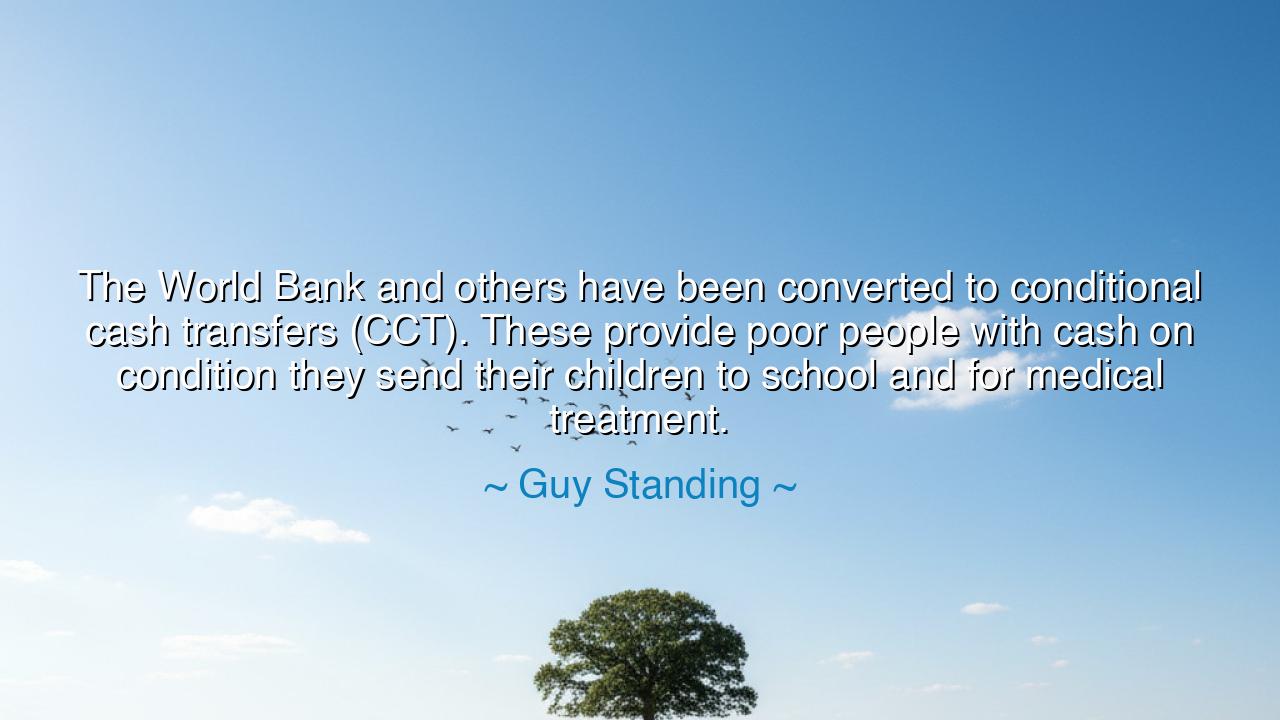
The World Bank and others have been converted to conditional cash
The World Bank and others have been converted to conditional cash transfers (CCT). These provide poor people with cash on condition they send their children to school and for medical treatment.






Hear the words of Guy Standing, who reveals the workings of power and poverty in our age: “The World Bank and others have been converted to conditional cash transfers (CCT). These provide poor people with cash on condition they send their children to school and for medical treatment.” In this statement lies both promise and peril. He speaks of conditional cash transfers, a tool meant to uplift the poor, yet tied to requirements that shape their choices. It is a gift, yet also a command; a helping hand, yet one that steers rather than simply supports.
The World Bank, an institution born of global rebuilding after war, once served chiefly as lender and overseer. Now, as Standing notes, it has embraced the philosophy of CCT: that the poor shall be granted resources not freely, but bound to conditions—send your children to school, bring your family for medical treatment, and the cash will be yours. At first glance, this appears noble, for education and health are pillars of life. Yet the words carry deeper meaning: the poor are not trusted to know their own needs without guidance, and the help they receive comes tethered to strings woven by distant powers.
In ancient times, empires too practiced conditional giving. Roman rulers distributed grain to the hungry, but always with expectations of loyalty, attendance at games, or submission to civic duties. The bread was real, the hunger was eased, but the freedom of choice was diminished. The giver’s hand fed and ruled in one motion. So too with CCT, where aid uplifts, but also governs. The paradox Standing illuminates is this: generosity becomes not pure compassion, but a mechanism of control.
Yet within this practice also lies hope. Consider the story of Mexico’s Progresa program, later called Oportunidades, one of the first great experiments in conditional cash transfers. Families received money if children attended school and if mothers brought them for health checkups. The program reduced child labor, increased school attendance, and improved health outcomes for the poor. It proved that sometimes, the gentle push of condition can open doors long shut by poverty. What once seemed charity became an investment in the next generation, reshaping the destiny of a people.
The meaning of Standing’s words, then, is layered. On one hand, CCT offers a way to break cycles of poverty, ensuring that aid is not wasted but directed toward education and health. On the other hand, it raises the question of dignity: should the poor be given aid only with conditions, as though they lack wisdom to decide for themselves? Or should they be trusted with the freedom of unconditional support, which honors their humanity and agency? The tension between compassion and control, between guidance and autonomy, has been with us since the dawn of organized society.
The lesson we may take is this: in offering aid—whether as individuals, communities, or nations—we must be mindful of the balance between help and humility. To give is not only to supply resources, but to honor the dignity of the receiver. When we tie conditions to our gifts, we must ask: do these conditions serve the true good of the people, or do they serve our desire to govern them? Let generosity be a ladder, not a leash; let it uplift without binding.
Practical action flows from this wisdom. Support programs that provide access to education and medical treatment for the poor, but also raise your voice for dignity and choice. When giving personally, do not give only with conditions that serve your pride—give in a way that strengthens the other’s independence. And if you are among those who receive, remember that your worth is not diminished by aid, for all humanity depends on one another in times of need.
Thus, Standing’s words echo like a riddle for our age: aid that uplifts, yet also controls; generosity that heals, yet also binds. Let us walk wisely in this tension, ensuring that in seeking to improve the lives of the poor, we do not strip them of their freedom. For the truest wealth is not merely money given, but dignity preserved. And this is the teaching we must carry forward into the generations to come.






AAdministratorAdministrator
Welcome, honored guests. Please leave a comment, we will respond soon